Resilience and Climate Change
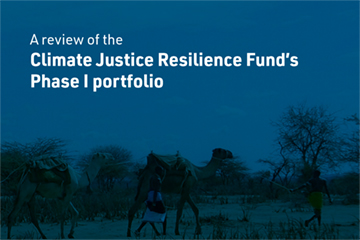
A review of the Climate Justice Resilience Fund’s Phase I portfolio
Climate Justice Resilience Fund – Final evaluation of a global grantmaking program supporting civil society organizations promoting climate resilience with a justice lens.

Mid-term evaluation of a global grantmaking program supporting civil society organizations promoting climate resilience with a justice lens.

‘This is now my path’: evaluation and learning for the community-based adaptation conference
The International Institute for Environment and Development (IIED) an its partners have been organizing the International Conference on Community-based Adaptation to Climate Change (CBA) since 2005. Over the years, the conference has adapted to stakeholder needs as well as the broader climate adaptation sector. We reviewed the conference theory of change and its influence on the practice of CBA.

Building Coalitions for Urban Resilience Toolkit (video)
This video serves as an introduction to why it is important to build coalitions for urban resilience in cities.

Urban Community Resilience Toolkits
A toolkit for practitioners to build coalitions addressing the increasingly complex issues facing urban areas. This coalition-building process engages a wide set of interested stakeholders from local government, civil society organizations, the private sector, academia, and community volunteers to identify and pursue locally developed solutions for resilience and climate change adaptation.
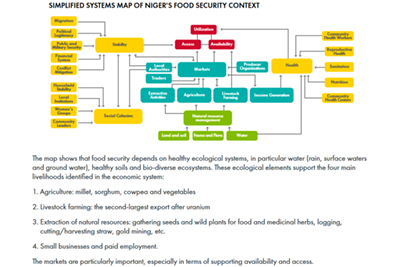
Niger Strategic Resilience Assessment
Led a Resilience Assessment in Niger for Mercy Corps International. Worked with staff from headquarters and field offices to carry out a process involving dozens of participants in multiple countries, created research design for community level Focus Group discussions, Key Informant Interviews, and Expert Interviews, reviewed secondary literature, and wrote a comprehensive report with a Theory of Change for a new 10 year strategy.
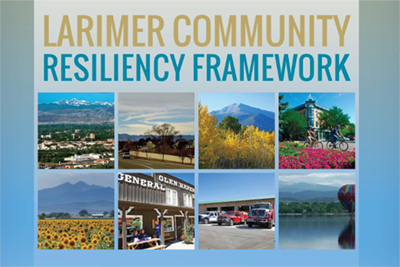
Colorado County Resiliency Plans
Facilitated stakeholder meetings in Larimer and El Paso Counties, Colorado as part of a County Resilience Planning process supported by the State of Colorado Recovery and Resilience Office and implemented by Ecology and Environment Inc. Designed and/or facilitated four workshops with other colleagues, and co-wrote the strategy sections of the County Resilience Plans.
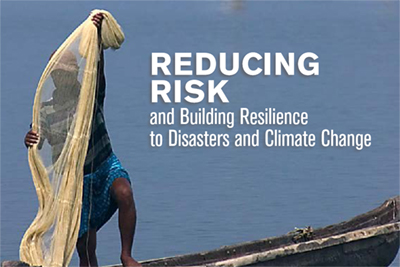
Reducing Risk and Building Resilience to Disasters and Climate Change
Wrote an agency wide Guidance Document for Mercy Corps staff on Disaster Risk Reduction, Climate Change Adaptation, and Resilience for Mercy Corps International. The document reviews the basics of these three interrelated fields, and guides staff into how to use all three to reduce risk for communities around the world to a variety of shocks and stresses. I also created an accompanying training workshop with a Facilitator’s Guide and Power Point,[CA1] with support from Adaptive Resources Ltd. and ISET International, and piloted the workshop in Portland, Beijing and Tokyo with a variety of NGO participants.
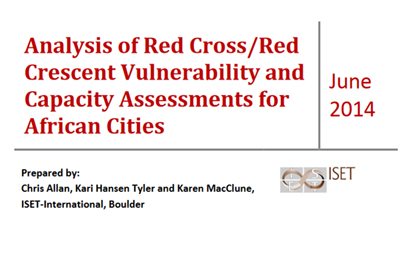
Analysis of Red Cross/Red Crescent Vulnerability and Capacity Assessments for African Cities
Analyzed ten Vulnerability and Capacity Assessments, and recommended extensive changes to handle the complexity and scale issues in urban areas. Conducted a resilience training in Kampala, Uganda and Nairobi, Kenya.

There are many resilience frameworks. Most of them take into account the complex interrelationships between the systems that people rely on, the organizations that run them, and the resources available. They are very powerful, but they take time to understand. For many purposes, simply a list of what makes things more resilient will do in a pinch. We wrote this list to explain some common characteristics of resilience, and how to apply them.
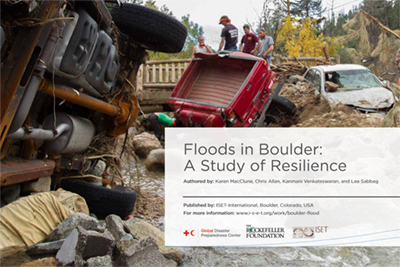
Floods in Boulder: A Study of Resilience 2014
Conducted a study with Dr. Karen MacClune and other staff of ISET-International right after devastating floods ravaged the Boulder area. This case study provides concrete examples of what makes a city resilient through the analysis of built infrastructure, human systems, and legal and cultural norms. This study diagnoses why the county came through unscathed in some areas while encountering massive damages in others. The study used a conceptual framework for understanding resilience developed by ISET-International that has proved to be extremely useful both in the US and internationally. Prof. Ron Brunner described it as “by far the most comprehensive and detailed account of last year’s floods I’ve seen….It is also among the best case studies I’ve seen on disaster mitigation and climate adaptation in other local communities.”

This video made by Boulder County Strong documented 22 neighborhood resilience conversations after extensive floods to find out what worked, what did not, and what people’s current priorities are for building resilience in the area.
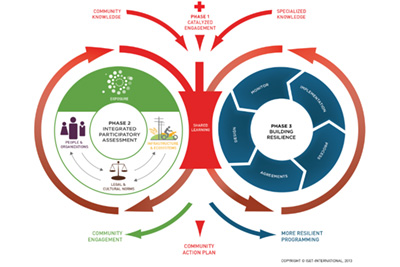
Developed a conceptual framework and training materials for the American Red Cross International Programs staff to develop strong community programs around the world to build resilience to climate and urbanization. Provided guidance on how to start programs in African cities, including connecting all scales of action to build resilience for vulnerable groups.
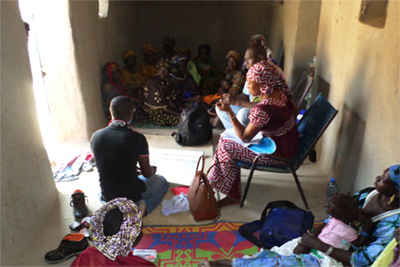
Gender-Sensitive Climate Vulnerability and Capacity Assessment of CARE Mali
Conducted a Gender-sensitive Climate Change Vulnerability and Capacity Analysis in the Mopti Region of Mali using Participatory Rural Appraisal tools, Key Informant Interviews, and secondary literature.

Critical Thresholds, Extreme Weather, and Building Resilience
Facilitated workshops for a NOAA-funded project with a multi-stakeholder group in the City of Boulder to test the use of climate thresholds as a useful way of planning for climate change. As part of a multi-disciplinary team led by Adaptation International and ISET, we helped small cities across the United States understand how to use climate thresholds to manage extreme weather events. The experience showed that staff from important local institutions like government departments, hospitals and non-profits all find it easier to make plans for adapting to climate change when it is framed in terms of extreme weather events that they already have experience of.
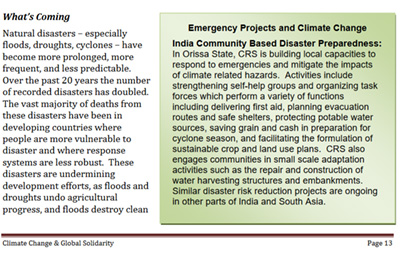
Climate Change and Global Solidarity
Led the first effort at Catholic Relief Services to determine its position on climate change, and what its role should be. This paper set forth the perspective of Catholic Relief Services on global climate change and served as a resource for agency staff to develop follow up plans, including advocacy positions, materials to inform and engage CRS’ US constituency, steps to ensure capacity in overseas programs, and management of CRS’ own impact on the environment. Specifically, the paper addresses how climate change is currently affecting the people, what is expected to happen into the future, what do the teachings of the Church say about how to respond to climate change and what can CRS do to meet this challenge.

Baseline Study for the Lutheran World Relief 12/12 Resilience Alliance in Niger
Designed and implemented a baseline study for Lutheran World Relief of nearly 13,000 households for the $13 million USAID-funded project 12/12 Resilience Alliance in Niger, with CESAF Sarl Consult in Niamey. The project included designing questionnaires, training enumerators, conducting baseline research, analyzing results, and reviewing findings with LWR staff and partners..
